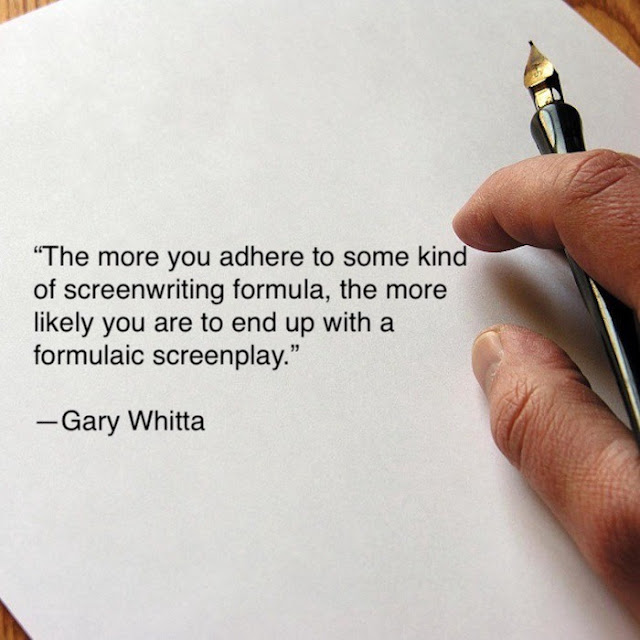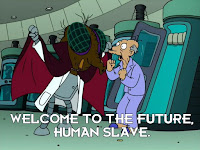Category: guru
August 4, 2020
Photo Tip
January 2, 2020
Behold—THE FUTURE
I like to start the year with kind of a quick reminder for all of us. How the ranty blog started, what it is, why I’m still doing it.
Easiest first. I more or less started this back in (gasp!) 2007. I was writing for a screenwriting magazine, and by nature of it I’d see tons of articles and websites about “helpful” tricks for networking, getting stuff in front of agents, producers, editors—all the sort of stuff you worry about after writing. I’d guess at least two-thirds of the “writing” articles, even in our own magazine, fell into this category.
Eventually, I tossed them up here just so it felt like I’d done something with them. I thought they were fairly well-written and I didn’t want them to languish on my computer. As I moved further into the full-time writer life, I was exposed to more and more people’s work. I read scripts for a couple different contests, which got me 400+ pages a day of exposure to it. And it struck me that I kept seeing the same basic mistakes being made again and again. So posting here became a regular thing.
It didn’t take long to realize a lot of aspiring writers fall into one of two groups. The first group thinks writing and storytelling are mechanical, quantifiable processes that can be broken down into definitive rules and formulas. They quote pieces from Writers Digest and the MLA Handbook to show why their novel deserves to be published, or point to screenwriting books as proof their script is perfect.
The other group thinks spelling, formatting, and structure just hamper the creative process. People always ignore those things once they see the inherent beauty in the prose, right? Nothing matters past the art flowing out of the writer’s fingertips, and anyone who says otherwise is a sellout who doesn’t understand what writing’s supposed to be about. Don’t know how to spell that word? Don’t know what the word means? Not in the mood to write? Someone said bad things about their writing? Absolutely none of it matters except being happy about their art.
Y’see, Timmy, there are correct and incorrect things in writing. I have to know how to spell (me—not my spellchecker). I have to understand grammar. I need to have a sense of pacing and structure and format. As a writer, I can’t ignore any of these requirements, because these are things I can get wrong and I’ll be judged on them. By editors. By agents. By readers.
On the other hand, there’s no “right” way to develop a character or outline or start my writing day. There’s only the way that’s right for me and my story. Or you and your story. Or her and her story. This is the Golden Rule I’ve mentioned here once or thrice. If we ask twenty different writers about “how to write,” we’re going to get twenty different answers. And allof these answers are valid, because all of these methods work for that writer.
 Again, that still doesn’t mean I can ignore every convention or rule I don’t like. I need to understand the rules if I want to break them successfully. Yeah, maybe there are ten or twenty people I can point at who broke the rules and succeeded. But I need to remember there are thousands, probably millions, of people who broke the rules and failed miserably.
Again, that still doesn’t mean I can ignore every convention or rule I don’t like. I need to understand the rules if I want to break them successfully. Yeah, maybe there are ten or twenty people I can point at who broke the rules and succeeded. But I need to remember there are thousands, probably millions, of people who broke the rules and failed miserably.
And that’s kinda what the ranty blog is about. I talk about writing. Not the after-the-fact-stuff, just…writing. I talk about the rules we all need to learn and follow (until we’ve got the experience to bend or break them). I offer various tips and suggestions I’ve heard over the years that may (or may not) help out when it comes to crafting a story or shaping a character or sharpening some dialogue. If there’s something you’ve been beating your head against that you’d like me to blab about, let me know down in the comments. I’ve been doing this for a long time now—there aren’t many topics I haven’t had a painful learning experience with, and I’m always willing to share.
Which I guess leaves “why.” And that’s pretty simple. Like I said, I’ve made lots and lots of mistakes on my path to “published, semi-successful, quasi-known author.” If I can help some of you get past them—or maybe just not spend so much time splashing around in them—I’d like to do it. I mean, people helped me, I should pass it on. And it’s not like writing is a zero-sum game. Helping you improve your chances doesn’t lessen anybody else’s chances. Really. I can show you the math if you like.
Simply put, I want you to succeed. And I’ll do what I can to help make it happen.
And that’s why I’m posting writing advice here every Thursday, and a bunch of stuff on Tuesdays too.
On a semi related note, I’d also like to recommend the Writers Coffeehouse to you. It’s a monthly meeting of writers of all types and levels to talk about… well, writing. All aspects from first ideas and editing to pitching and marketing. It’s completely free—no obligations or requirements of any kind—it’s kinda fun, and it’s open to everyone. If you’re in the LA area, I host it on the second Sunday of every month (which would be ten days from now) at the wonderful Dark Delicacies bookstore in Burbank. If you’re closer to San Diego, Jonathan Maberry (the guy behind V-Wars and the Joe Ledger books) hosts one on the first Sunday of every month (for example this Sunday) at the Mysterious Galaxy bookstore. And I think at this point there are a dozen others scattered across the country. Boston, San Francisco, Durham NC, Sacramento… I should really dig up the full list. Please check one of them out if you’re in the area.
Next time, I’d like to talk about the process of writing. Your process, actually.
June 21, 2018 / 3 Comments
So You Want to be a Writer?
I’ve mentioned Kristi twice or thrice here before. She’s—and I’m not joking—an archeologist turned genetic engineer turned fantasy author. No, seriously. She’s pretty much solely responsible for making me like urban fantasy for the first time since college. The first book in her Kincaid Strange series, The Voodoo Killings, is finally available in the US as a paperback, so you should go grab a copy.
 Anyway, because we live in different countries with a sizable chunk of North America between us, it was a special treat to get to hang out with Kristi in person at Phoenix Comic Fest last month. There were many drinks and meals, and much talk about writing and publishing. Including one very interesting discussion about teaching, fueled by her much more academic viewpoint.
Anyway, because we live in different countries with a sizable chunk of North America between us, it was a special treat to get to hang out with Kristi in person at Phoenix Comic Fest last month. There were many drinks and meals, and much talk about writing and publishing. Including one very interesting discussion about teaching, fueled by her much more academic viewpoint. If the Greatest Heart Surgeon Medical School was real it would be considered a resounding failure. Any program – history, life science, biology, forestry- run that way would be shut down – fast – because everyone grasps that there is more to medicine and a robust medical community than heart surgery and wasting 80% of your student body trying to mold the best isn’t just wrong, it’s stupid, idiotic, asinine, the work of a delusional heart surgery megalomaniac.
If the Greatest Heart Surgeon Medical School was real it would be considered a resounding failure. Any program – history, life science, biology, forestry- run that way would be shut down – fast – because everyone grasps that there is more to medicine and a robust medical community than heart surgery and wasting 80% of your student body trying to mold the best isn’t just wrong, it’s stupid, idiotic, asinine, the work of a delusional heart surgery megalomaniac. Expensive/Questionable value/not recommended: All Star/Celebrity/NYT Bestselling/Intensive Author Workshop and/or Cruise. They range from two to six weeks, cost upwards of four grand, and often boast a rotating roster of world class authors as instructors. You do get one on one time with the authors as advertised and that might be incentive enough for the odd superfan. I don’t recommend them. The instructors might be star studded novelists but that doesn’t mean they can teach and their alumni track records leave much to be desired. In comparison, self-driven, free writer’s groups have a staggering publication success rate. A new laptop and a trip to a remote cabin to write is arguably a much better return
on a four thousand dollar investment.
April 17, 2018 / 9 Comments
We’ve Never Met, But…
These days it’s almost too easy to get in touch with people. Especially famous (and semi-famous) people. Email. Social media. Appearances. It’s not uncommon to get a like, a response, maybe even a follow from somebody you admire.
If I’m trying to convince a chef to take me on as apprentice, what’s he going to think when I tell him my secret pizza topping is iron filings? Or if I tell a doctor my last patient’s midichlorian count was super-low because Mercury’s in retrograde? If I want help from a professional, I’ve got to show them I’ve got a firm grasp on the basics of my chosen field. For us, that’s spelling and grammar.
Just to be clear, if I said hello and shook hands with Wakko at a party three years ago, this really doesn’t mean I’ve known him for three years. Do you remember that guy you met at a party three years ago and then never spoke with again? No? Odd that…
This doesn’t include me eating in the same food court while I stalked Wakko in the mall. Again, what is it with following people around stores. Cut it out. That’s just creepy.
The key thing here is I need to remember communication is a two-way street. Me spamming Wakko with messages and responses through multiple channels does not count as communicating. Just being someone’s friend on Facebook, Twitter, or Mastodon doesn’t qualify, either. No, really. Check the terms of agreement—none of these websites have a “guaranteed friends with benefits” clause.
 This should be self-explanatory. Not in the sense of “on the planet at the same time” or “crashed on the couch for a week,” but more in the “sharing rent and chores around the kitchen for several months” way. After living in the same apartment/house/hostel for six months, I shouldn’t feel too much reluctance about asking Wakko to take a quick look at something I wrote.
This should be self-explanatory. Not in the sense of “on the planet at the same time” or “crashed on the couch for a week,” but more in the “sharing rent and chores around the kitchen for several months” way. After living in the same apartment/house/hostel for six months, I shouldn’t feel too much reluctance about asking Wakko to take a quick look at something I wrote. In any sense. Again, this should be self-explanatory. I’d very much advise against making this an active networking technique, though. For a whole bunch of reasons.
Okay, here’s one of those ugly truths, and if you’ve been listening to me rant for any amount of time you’re probably already aware of it.
Look, when I was starting out as a writer you had to dig through magazines, make phone calls, send request letters, then go dig through more magazines, make different phone calls, and send different letters–and keep track of all of it.









